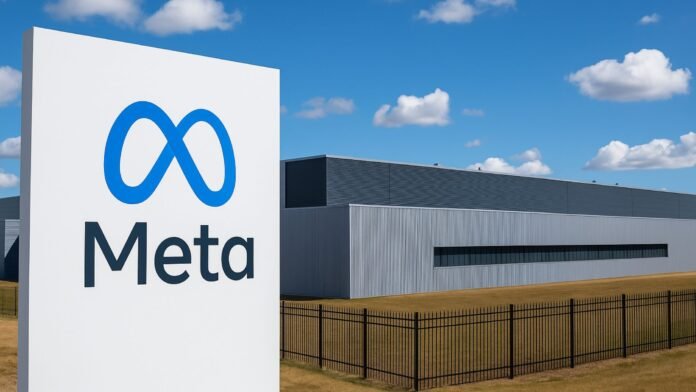The AI Arms Race: Meta Seeks $29 Billion in Private Funding for Massive Data Center Buildout
The global race for Artificial Intelligence supremacy is escalating, and the battlefield is increasingly shifting to the physical world: massive, power-hungry AI data centers. In a testament to this intense competition, Meta Platforms is reportedly in advanced discussions to raise an astounding $29 billion in private funding to fuel the construction of its next-generation AI data centers across the United States. This monumental fundraising effort, comprising an estimated $3 billion in equity and $26 billion in debt, underscores the unprecedented capital expenditure required to win the AI frontier.
The Scale of Ambition: Why $29 Billion?
Meta’s pursuit of such a colossal sum highlights the sheer scale of its AI ambitions. CEO Mark Zuckerberg has publicly stated that 2025 will be a “defining year for AI” for the company, with plans to spend as much as $65 billion this year on AI infrastructure. The goal is audacious: to build a data center network “so large it would cover a significant part of Manhattan” and house over 1.3 million AI processors by 2026.
Training and running advanced AI models, particularly large language models (LLMs) and generative AI applications, demand immense computational power and specialized infrastructure. Traditional data centers are simply not equipped to handle these workloads, requiring Meta to invest heavily in purpose-built facilities capable of connecting thousands of high-performance chips. This explains the need for gigawatt-scale power, energy-efficient cooling solutions, and the development of custom AI chips to reduce reliance on third-party suppliers.
A Strategic Pivot: Leveraging Private Capital
Interestingly, despite a robust balance sheet (reportedly nearly $70 billion in cash), Meta is turning to private capital firms like Apollo Global Management, KKR, Brookfield, Carlyle, and PIMCO. This strategic pivot signals several key motivations for the tech giant:
- Speed and Flexibility: Private credit offers greater flexibility and speed compared to traditional public debt markets, allowing Meta to secure funding quickly for its aggressive buildout schedule.
- Off-Balance Sheet Leverage: Structuring a significant portion as private debt helps Meta manage its public debt stack and keep leverage off its core balance sheet, offering financial maneuverability.
- Bespoke Covenants: Private credit deals can be tailored with bespoke covenants that suit the unique needs and long-term nature of large infrastructure projects.
- Reduced Public Scrutiny: Private financing offers a degree of privacy, allowing Meta to execute its strategy with less immediate public market scrutiny on the specific terms and conditions.
Meta is reportedly working with advisers at Morgan Stanley to structure the financing in a way that could improve the tradability of the debt once it’s issued, potentially even exploring a leaseback model where investors fund and own the data centers, leasing them back to Meta. This mirrors strategies used by other hyperscalers to reduce upfront capital expenditure.
The Broader AI Infrastructure Arms Race
Meta’s massive investment is not an isolated event; it’s a prominent indicator of an industry-wide AI infrastructure arms race. Rivals like Microsoft are planning to spend over $80 billion on AI data centers in 2025, while OpenAI is a key partner in the “Stargate” project, a consortium aiming for hundreds of billions in data center resources. Amazon is also building substantial data center capacity to support its AI endeavors.
This intense competition is driving unprecedented demand for specialized data centers, pushing the boundaries of power consumption, cooling technologies, and chip design. The collective investment by tech giants highlights a consensus: leadership in AI hinges directly on owning and operating the underlying computing infrastructure at an unprecedented scale.
Implications for the Startup Ecosystem and Beyond
This funding trend has significant implications:
- Increased Demand for AI Infrastructure Startups: Companies specializing in data center design, construction, cooling, power management, and advanced chip technologies will see booming demand.
- Focus on Energy Solutions: The immense power requirements of AI data centers (some approaching the output of a nuclear plant) will accelerate innovation and investment in renewable energy sources, grid optimization, and potentially even nuclear energy solutions, as Meta has already explored.
- Talent Scramble: The need to build and operate these complex facilities will intensify the competition for skilled engineers, data center operators, and AI specialists.
- Geopolitical and Supply Chain Considerations: The sourcing of critical hardware components, particularly advanced AI chips, and the geographical distribution of these data centers will become increasingly strategic.
Meta’s $29 billion quest for AI data center funding is a stark illustration of the capital-intensive nature of the AI revolution. It’s a bold bet that solidifies the company’s commitment to leading the charge in artificial intelligence, transforming the digital landscape one gigawatt at a time. For founders and innovators across the tech spectrum, this signals a massive opportunity in the enabling infrastructure that will power the AI-driven future.
Are you a startup founder or innovator with a story to tell? We want to hear from you! Submit Your Startup to be featured on Taalk.com.








